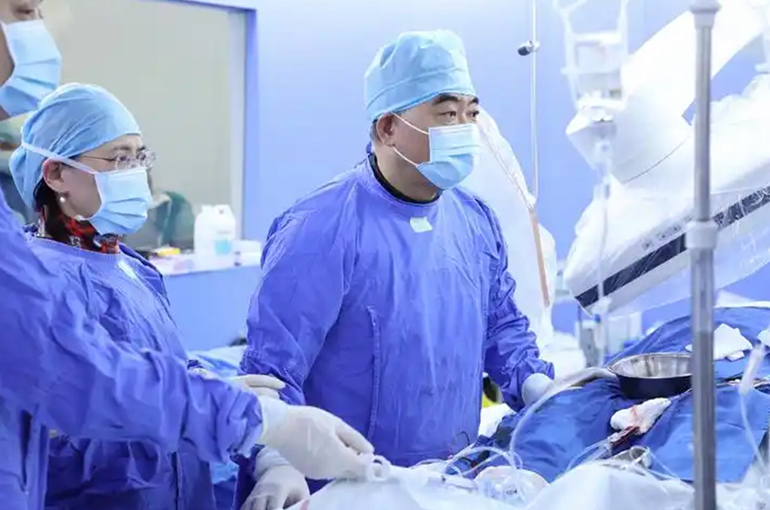 AI Is Reshaping Patient Care at Shanghai’s Top Hospitals
AI Is Reshaping Patient Care at Shanghai’s Top Hospitals(Yicai) May 26 -- The use of artificial intelligence has changed clinical diagnosis and treatment from an experience-based practice to a data-driven approach, bringing revolutionary changes to medical services in Shanghai's leading hospitals.
“Digital twin doctors” are becoming vital medical team members at Zhongshan Hospital, former President Fan Jia told Yicai. These digital avatars are created by modeling and simulating the hospital's actual doctors, going beyond simply copying their knowledge and experience, he added.
Some digital medics have already taken shape, including Dr. Xiao Ge, the avatar of Ge Junbo, who heads the hospital’s cardiology department, and Dr. Xiao Bai, the avatar of Bai Chunxue from the respiratory medicine department, said Fan, who is also a member of the Chinese Academy of Sciences.
“These AI doctors can proxy the real doctors to complete medical consultations, patient education, science popularization, professional training, and other tasks, and even analyze patients' medical data, simulate disease progression, and predict treatment effects,” Fan noted.
Zhu Tongyu from Zhongshan Hospital's kidney transplant department told Yicai that his team is developing an AI platform that integrates massive case analyses and academic literature, aiming to turn it into the department's “super brain.”
Yizhi, the hospital’s organ transplant AI software, has been mainly used in the kidney transplant department as both a reliable assistant for surgeons and a 24/7 personal health manager for patients, Zhu pointed out.
He believes that in the future, systems such as smart surgical assistants and treatment planners will allow one doctor, with the help of many intelligent agents, to care for many patients at the same time, significantly improving diagnosis and treatment, cutting medical costs, and helping patients to live longer.
Remote Surgery
With the integration of fifth-generation communication and other technologies, AI surgical robots are becoming sought-after "magic tools" in major hospitals, according to Ge, who successfully treated a patient 5,200 kilometers away using robot-assisted equipment last May. Since then, the number of AI-assisted remote surgeries has increased, he added.
On April 22, experts from Shanghai Ruijin Hospital used the self-developed Rui Surgery platform to remotely operate surgical robots for five patients in suburban areas of the city and in the provinces of Fujian, Yunnan, Jiangxi, and Hainan. They performed complex surgeries on the pancreas, liver, gallbladder, urogenital system, and gastrointestinal tract.
“We've liberated surgical operations from traditional operating rooms,” Ning Guang, president of Ruijin Hospital, said at a conference following the surgeries. “Doctors can perform surgeries remotely from intelligent surgical centers without wearing surgical gowns or traveling long distances.
“This is not just a technological breakthrough but also a milestone in the history of surgery,” Ning pointed out.
With AI, surgery is no longer confined to operating theaters, Ning said, noting that it can be done from offices, planes, or high-speed trains. Anywhere with internet access can enable a doctor to provide medical services through remote surgical platforms, Ning said.
Doctors Still in Charge
“AIs are not executors of medical actions, and AI doctors cannot shoulder medical responsibilities,” Qian Juying, vice president of Zhongshan Hospital, said in regard to handling disagreements between doctors and AI. “Doctors still bear legal responsibility for medical practices.”
"When building AI medical models, preserving the bottom line of life-first is more important than technology," Ning noted. "We only use technologies that can withstand verification.”
Ge pointed to the growing ethical issues in using AI technology, such as medical data security. "Technology is developing far faster than regulation, so establishing ethical norms for AI diagnosis and treatment is a critical challenge,” they said.
The goal of training AI is to "teach AI to think like top doctors,” Ge noted. AI will not replace medics but will enable them to surpass the physical limits of human hands, he stressed, adding that this is the true meaning of AI driving medical progress.
“In medical services, humans must always lead where empathy, creativity, and moral judgment is required," a cardiologist based in Shanghai told Yicai. “The future medical system will not be about machines replacing humans but using machines to liberate doctors from repetitive labor.”
Editors: Tang Shihua, Martin Kadiev